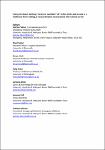Taking the biscuit: defining excessive quantities of free refreshments in a healthcare library
| dc.contributor.author | Tabner, A | |
| dc.contributor.author | Spicer, Stuart | |
| dc.contributor.author | Husk, Kerryn | |
| dc.contributor.author | Blake, H | |
| dc.contributor.author | White, C | |
| dc.contributor.author | Toft, S | |
| dc.contributor.author | Johnson, G | |
| dc.date.accessioned | 2023-03-24T16:44:28Z | |
| dc.date.available | 2023-03-24T16:44:28Z | |
| dc.date.issued | 2022-12-19 | |
| dc.identifier.issn | 0959-8154 | |
| dc.identifier.issn | 1756-1833 | |
| dc.identifier.other | e072846 | |
| dc.identifier.uri | https://pearl.plymouth.ac.uk/handle/10026.1/20628 | |
| dc.description.abstract |
Evidence suggests that complementary hot drinks and biscuits benefit an overworked and highly stressed healthcare workforce. But when signage in healthcare libraries asks patrons not to consume “excessive” quantities of free hot drinks and biscuits, how much is too much? Tabner and colleagues explore this resource allocation conundrumAs the festive season approaches, temperatures plummet, days shorten, and healthcare workers see glimmers of time off around the holidays, some might consider the provision of unlimited free hot drinks and biscuits a welcome token of appreciation; this is particularly the case for National Health Service staff, who are often felt to be underpaid and undervalued.12 A chance observation of signage in a hospital library requesting that patrons avoid “excessive” consumption of free hot drinks and biscuits (fig 1) does, however, raise the question: if some people take more than others in a system constrained by both finances and logistics, might some staff end up getting the short end of the teaspoon?Fig 1 Observed signage in a hospital libraryAs sweet (and seemingly bottomless) as the ubiquitous communal box of Quality Street3 may be, the term “excessive” in the context of free refreshment consumption is open to interpretation. The Oxford English Dictionary defines excessive as “exceeding what is right, proportionate, or desirable,”4 suggesting that individuals may apply their own values and judgments. Interpretations may therefore vary depending on appetite, taste, income, the proximity of snacks to beverages, psychological determinants (eg, stress and guilt), and myriad factors not yet considered. But how much is too much? Furthermore, who judges etiquette in such situations, and how might opinions differ between staff members? One of the current authors described regularly succumbing to Bentham’s Panopticon effect,5 where behaviour is modified to avoid that uncomfortable feeling of being perceived as greedy by others. … | |
| dc.format.extent | e072846-e072846 | |
| dc.format.medium | Electronic | |
| dc.language | en | |
| dc.publisher | BMJ Publishing Group | |
| dc.subject | Humans | |
| dc.subject | Food | |
| dc.subject | Health Facilities | |
| dc.title | Taking the biscuit: defining excessive quantities of free refreshments in a healthcare library | |
| dc.type | journal-article | |
| dc.type | JOUR | |
| plymouth.author-url | http://www.bmj.com/content/379/bmj-2022-072846.abstract | |
| plymouth.volume | 379 | |
| plymouth.publication-status | Published online | |
| plymouth.journal | British Medical Journal | |
| dc.identifier.doi | 10.1136/bmj-2022-072846 | |
| plymouth.organisational-group | |Plymouth | |
| plymouth.organisational-group | |Plymouth|Research Groups | |
| plymouth.organisational-group | |Plymouth|Faculty of Health | |
| plymouth.organisational-group | |Plymouth|Research Groups|Institute of Health and Community | |
| plymouth.organisational-group | |Plymouth|REF 2021 Researchers by UoA | |
| plymouth.organisational-group | |Plymouth|Users by role | |
| plymouth.organisational-group | |Plymouth|Users by role|Academics | |
| plymouth.organisational-group | |Plymouth|REF 2021 Researchers by UoA|UoA20 Social Work and Social Policy | |
| plymouth.organisational-group | |Plymouth|Faculty of Health|Peninsula Medical School | |
| plymouth.organisational-group | |Plymouth|Research Groups|FoH - Community and Primary Care | |
| plymouth.organisational-group | |Plymouth|Users by role|Researchers in ResearchFish submission | |
| plymouth.organisational-group | |Plymouth|Research Groups|Plymouth Institute of Health and Care Research (PIHR) | |
| dc.publisher.place | England | |
| dcterms.dateAccepted | 2022-12-05 | |
| dc.date.updated | 2023-03-24T16:44:27Z | |
| dc.rights.embargodate | 2023-3-31 | |
| dc.identifier.eissn | 1756-1833 | |
| dc.rights.embargoperiod | forever | |
| rioxxterms.versionofrecord | 10.1136/bmj-2022-072846 |


